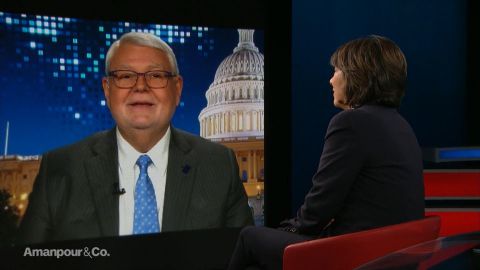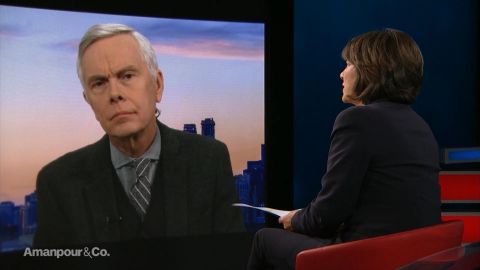Read Transcript EXPAND
CHRISTIANE AMANPOUR: Now we turn back to the United States where a group of online writers are forcing us to ask the question where should we draw the line between provocative thought and those who simply want to be provocateurs. The editor, Claire Lehmann, founded the website Quillette as part of the so-called intellectual dark web. It’s oftentimes a platform for those whose controversial views on issues like race, gender and even sexual assault were considered far too extreme for mainstream publications. So when they spoke in New York, Lehmann told our Alicia Menendez why she’s so determined to keep prodding the boundaries of acceptable discourse.
(BEGIN VIDEOTAPE)
ALICIA MENENDEZ: Thank you so much for joining us.
CLAIRE LEHMANN, FOUNDING EDITOR, QUILLETTE: Thanks for having me.
MENENDEZ: You yourself were writing pieces that you felt weren’t getting the publication or the attention that you believe they deserved.
LEHMANN: Yes. And I think that’s simply because my thoughts and my views didn’t neatly fit into a box, a conservative box or a progressive box. They were somewhat in the middle somewhere or just outside that framework. So I was interested in, for example, men and women’s different interest in occupations and often criticized by (ph) the feminist narrative which portrays men and women’s choices as being somewhat forced or socially constructed. I was interested in evidence that suggested that men and women come to different occupations because they have innate differences.
MENENDEZ: There’s a term we hear thrown around a lot and that is P.C. culture.
LEHMANN: Yes/
MENENDEZ: So I wonder first if you’re a believer that we’re living in a time of P.C. culture and if so, if you could you define that for me.
LEHMANN: Yes, I do believe we’re living in a time of increasing political correctness. And it’s difficult to define, exactly, but I think one of the — the — the — some evidence that we are is the amount of people who are getting into trouble for voicing opinions that they wouldn’t have gotten into trouble for maybe five or ten years ago. And we can see this on social media, people get mobbed (ph), people are losing their jobs now over, you know, some pretty benign opinions. Even saying something like men and women are different or have biological differences can be considered controversial in some contexts.
MENENDEZ: So can you give me an example of someone who you believe lost their job over what was a benign opinion?
LEHMANN: I think there’s the example of James Damore at Google. He wrote a memo and it had various arguments and hypotheses in it, but then his memo was presented in mainstream press as being this anti-diversity screed and he said that women can’t do the jobs of computer science and technology engineering up to the same standard as men. But he never made those arguments. He presented much more nuanced arguments based on empirical evidence showing that men and women have on average different interests. And so I think the way in which we strip down complicated and complex arguments and present them in a simplistic fashion is a symptom of P.C. culture and it’s driving P.C. culture as well.
MENENDEZ: There’s currently a piece on Quillette, the new war on comedy, which takes a look at Louis C.K., who is someone who has admitted to wrongdoing, but there’s a question of if he gets to return, when he gets to return and how free speech operates in the context of comedy. Where do you come down on that?
LEHMANN: Well, I come down on the side of whatever is funny is comedy and —
MENENDEZ: Understanding that that’s wildly subjective.
LEHMANN: Absolutely. But laughing at something — laughter is an involuntary response. So if a comedian makes a joke and we laugh, there’s no gap between the joke and the act of laughing where we can say hang on, is that an appropriate joke or not. We just laugh if it’s funny. And I think comedians play a really important role in exposing some of the hypocrisies and some of the empty dogmas in society and breaking convention and being transgressive. I think as soon as we start clamping down on comedians and telling them what they can and can’t joke about, I think we’ve become a less free culture and society and I think it’s dangerous.
MENENDEZ: Is it wrong for #MeToo victims to be upset, then, by his comeback?
LEHMAN: Oh, look, #MeToo victims can be upset over whatever they want, I just don’t think the rest of us have to necessarily pay attention or listen to their demands. I mean, people can have any kind of emotional response that the — they choose to have, but it’s not — it’s not — that doesn’t mean that we all have to suddenly comply with — with demands that these people have.
MENENDEZ: There’s also a piece on the site about the posthumous #MeToo-ing of J.D. Salinger. Is it going too far to look back retrospectively at the men of history in the context of #MeToo?
LEHMANN: There’s nothing wrong with going back and relooking at behavior of historical figures. I think it just becomes problematic when suddenly we don’t read the books of (inaudible) authors because they weren’t up to our moral standards. And I think we miss out on precious literature and precious art when we constantly judge artists and people of the past by our current moral standards.
MENENDEZ: What, then, do you define as a dangerous ideal? What crosses the line for you?
LEHMANN: Well, we — we are all liberal humanists and we believe in the dignity of all human beings and we don’t like — we don’t publish anything where individuals are denigrated or groups are denigrated in moralistic terms. And so we don’t — there’s one reason why we reject identity politics. We think all people are equal and all groups are equal. However, we do think there are empirical questions that are open and we’d like to explore them about differences between people and their interests and occupations and preferences and that type of thing.
MENENDEZ: The vast majority of names that are publically identified with the intellectual dark web are white men.
LEHMANN: Yes.
MENENDEZ: What do you make of that?
LEHMANN: Well, I think it’s a bit of a misrepresentation because there are people in this so called intellectual dark web who aren’t white men such as Coleman Hughes, my star contributor, John McWhorter, Glenn Lurie, Ayan Hersiale, Maajid Nawaz, Deborah Soh —
MENENDEZ: So you agree you agree that those names are not nearly as well known as Jordan Peterson or Ben Shapiro.
LEHMANN: Well, I mean that’s partly because the mainstream give Jordan Peterson and Ben Shapiro more of a platform than these lesser, well known names. And — and perhaps that’s something that should be remedied and rectified. Perhaps these other individuals should be given more of a platform.
MENENDEZ: If the intellectual dark web is anti-tribalism, how do you respond to the critique that you’re simply creating your own tribe?
LEHMANN: Well, I think the critique is correct. I think we are creating our own tribe. And it is something to watch out for because we will become susceptible to our own form of groupthink and confirmation bias. Absolutely.
MENENDEZ: Where do you see that tribalism manifesting?
LEHMANN: Well unfortunately today you see that kind of tribalism occurring on university settings more and more, where — where theories like — such as intersectionalty are becoming more popular, where — for example, not just on university settings but I believe the women’s march that has occurred here in the United States has gotten into a bit of trouble for excluding Jewish women for their privilege. And I know that in California a women’s march was cancelled because some of the organizers thought that too many white women were going to be on the women’s march. And it’s that kind of tribalism which we critique because we don’t think that’s helpful, we don’t think that judging people or shutting down conversations or ranking people according to their privilege on the virtue of their skin color is in any way useful at all.
MENENDEZ: I wonder how much of it, though, in the context of America and in America becoming a majority-minority country has to do with the fact that people who have marginalized identities — African Americans, Latinos, women — for so long were shut out of the corridors of power and in many ways what they’re looking for now is not to exclude but to create a sense of community and belonging for those who have often felt on the margins.
LEHMANN: Yes. Look, I don’t think there’s anything wrong with that and I don’t that is not beneficial. I think it becomes a problem, however, if groups are seeking reparations or seeking to punish
LEHMANN: Beneficial, I think it becomes a problem however if groups are seeking reparations or seeking to punish groups that they perceive as being oppressors. So at the moment white men are sort of this group who are perceived as this big oppressor class, and because white men have always held power throughout history now there needs to be some sort of redress. And I’m not saying that power shouldn’t be shifted away towards other groups, but if we’re going to be looking at individual white men they’re not necessarily guilty for hundreds of years of power held by their identity group. I think the problem is when we attribute guilt and blame to people who have not done anything personally wrong.
MENENDEZ: So can you give me an example of someone who has experienced that?
LEHMANN: Oh well you see it — we’ve seen it in the United States on college campuses with some of the rape culture rhetoric where young men have found themselves caught up in unjust sort of procedures on campus where they are found guilty by universities but they haven’t had their full due process rights protected. And often the argument’s made well white men for so long have had so much power and rape — or sexual assault hasn’t been prosecuted as aggressively as it should have, so what does it matter if some innocent men are being unfairly convicted or charged on university campuses.
MENENDEZ: Who is making that argument?
LEHMANN: Jessica Valenti on Twitter has made the point that she doesn’t care if innocent men are now afraid of women, because this is the time for redress. The “Me Too” movement and prosecuting aggressively, prosecuting sexual assault and sexual harassment in the workplace, it’s time for a reckoning and if innocent men are afraid then that’s bad luck. That argument has been made.
MENENDEZ: There’s a difference between innocent men being afraid and innocent men being unduly prosecuted.
LEHMANN: Yes, yes. Well you know I would say someone like the mathematics professor who had his paper censored in an academic setting I would say that’s an innocent man. We had the Duke lacrosse players who were charged — or the accusations of rape against them fell apart. It was the “Rolling Stone” article which alleged a rape happening at Virginia University — UVA and that fell apart, that was a false story and now the “Rolling Stone” are being sued. I know that there’s been dozens of lawsuits in the United States on behalf of young male students who have been found guilty on university campuses but in actual courts — in the actual justice system they’ve — that decision has been overturned and there are dozens and dozens of lawsuits. So I think there is a real issue, and it can’t just be swept under the rug.
MENENDEZ: Would you say that the intellectual darkweb is anti-victimhood?
LEHMANN: Yes, yes.
MENENDEZ: Is there then a contradiction in declaring yourselves “victims of PC culture” who are anti-victimhood?
LEHMANN: Yes, I think there is a contradiction somewhat and it’s an interesting one to navigate. Certainly there are true victims of call-out culture, people who have lost their jobs because of something they’ve said on social media, and I would argue that losing a job over a comment made on Twitter is perhaps a disproportionate punishment. At the same time, I think there’s a real danger in people like myself and the tribe that we are a part of perceiving ourselves as victims. Because as soon as you perceive yourself as a victim you lose a sense of agency and sense of purpose. And so, although there are problems with call-out culture and some people have lost jobs and some people do feel silenced in university settings and that type of thing, we have to always be very careful not to overplay that and undermine our own agency by thinking that we are victims of this cultural phenomenon. Because in the long run we really aren’t.
MENENDEZ: Thank you so much Claire.
LEHMANN: Thanks for having me.
About This Episode EXPAND
Christiane Amanpour speaks with former British Prime Minister Tony Blair; National President of the Federation of Government Employees J. David Cox Sr.; and former Canadian Ambassador to China David Mulroney. Alicia Menendez speaks with Claire Lehmann about pushing the boundaries of acceptable discourse.
LEARN MORE



